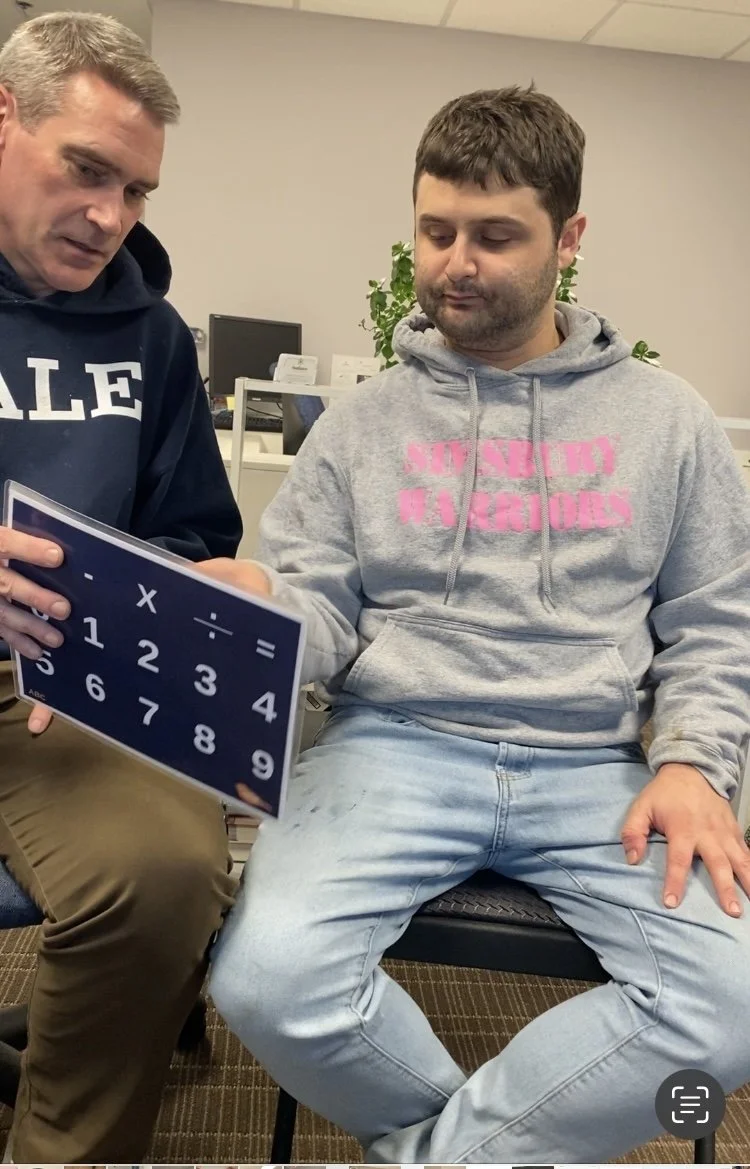Listening Beyond Words, the Path to Finding Michael’s Voice
By Marcy Nirschel, BS, MA, Special Education
DIR Floortime Certified Clinician
Our son Michael is 32 years old, autistic and non-speaking.
He was born typically and developed well during his first 15 months. However, shortly after receiving his 15-month vaccinations, he stopped progressing and became unresponsive. When we raised our concerns, pediatricians dismissed them, suggesting that his earlier development had been a misperception and that he had always been severely autistic.
That narrative followed him.
Michael was educated in a private school that focused solely on sensory needs. Academic learning wasn’t just discouraged – it was never even attempted. We were told again and again that he was extremely low-functioning, and that the best we could hope for was to keep him happy, well cared for, and as regulated as possible in terms of sensory input.
I knew that Michael had been a perfect baby, beautiful, full of promise and hope, meeting each milestone. Using my gut instincts as a mom and developmental specialist, I felt that Michael was still in there.
the search begins
As my husband and I traveled throughout the east coast to different doctors, specialists and therapists looking for answers, we tried interventions from occupational and speech therapy, Auditory integration training, Cranial Sacral therapy, Diets restrictive of casein, gluten and yeast, holistic remedies, medical treatments, invasive labs, intensive sensory processing therapies and much more. I told anyone who would listen, that Michael was smart and I knew he was still in there. Eventually with three children following, the depletion of our funds and no significant positive results, we started giving up on traveling for treatments, staying within CT with a focus on working with the school system.
At each meeting, I was met with condescending looks when I tried explaining that I knew Michael was smart. With no one left to listen to me, I gave up my mantra. As Michael's frustration increased with no means of communication, negative behaviors increased. He became seen as a behavior problem, in need of ABA therapy and medication. The dehumanizing method of ABA only increased the negative behaviors, as my smart child desperately tried to communicate.
When Michael turned 21, he completed school and moved into a group home with two other young men, each supported by a 1:1 staff member. Due to his apraxia and dyspraxia, Michael has never been able to care for himself independently; he requires assistance with basic tasks such as using the bathroom, showering, and eating. When overwhelmed, he may run away, and he has never been able to answer questions or express himself verbally or by pointing. By 2022, we had all but given up hope for meaningful progress.
And then, something unexpected happened.
A therapist in Pennsylvania recommended we try the Tomatis Method, an auditory therapy that uses music to calm the nervous system. To our surprise, we observed improvements in Michael’s sleep, emotional regulation, motor planning, and responsiveness. It was a glimmer of light, enough to keep us looking.
In the spring of 2023, we watched a documentary called *Spellers*, which introduced us to “Spelling To Communicate”, a communication technique that enables non-speaking individuals with autism to spell out words using a simple letter board. Just a few weeks later, a practitioner opened an office in Stamford, CT, our hometown. He was offering a free trial session.
With nothing to lose, we brought in Michael.
A new start
That first session was dramatic. Michael was overwhelmed and wanted to leave, pulling us out of the office and all the way to the car. But then the therapist ran after us with the letter board and insisted on trying again, this time in the car. Michael’s distress continued until suddenly, something clicked. His face softened, his body calmed, and miraculously he began to spell words and respond to questions.
That day marked the beginning of a new chapter for Michael and our family.
Since then, Michael has attended spelling sessions nearly every week. He now communicates freely using the letter board, expressing complex and insightful thoughts. What began with simple history questions has evolved into deep conversations about politics, life, friendship, family, and his favorite subject, spirituality. Michael’s vocabulary is rich, his intellect remarkable.
After more than 25 years of believing our son was “low-functioning,” we’ve discovered that he is highly intelligent, heartbroken over the education he never received, eager to learn, and deeply grateful for the love and support of his family.
how we change the next person’s path
There are roughly 31 million non-speaking autistic individuals in the world. Many, like Michael, live with apraxia or dyspraxia – conditions that affect motor planning and make verbal speech impossible. Most have been profoundly misunderstood, underestimated and denied access to education. They are treated as if they are not fully there, lacking intelligence or awareness. But they are.
We are only now truly getting to know our son – and we feel incredibly blessed that he has finally found a way to share his voice with the world.
To any parent reading this who is still searching, still hoping: don’t give up.
Keep pushing.
The moment of connection may not come when or how you expect it – but when it does, it will transform everything.

